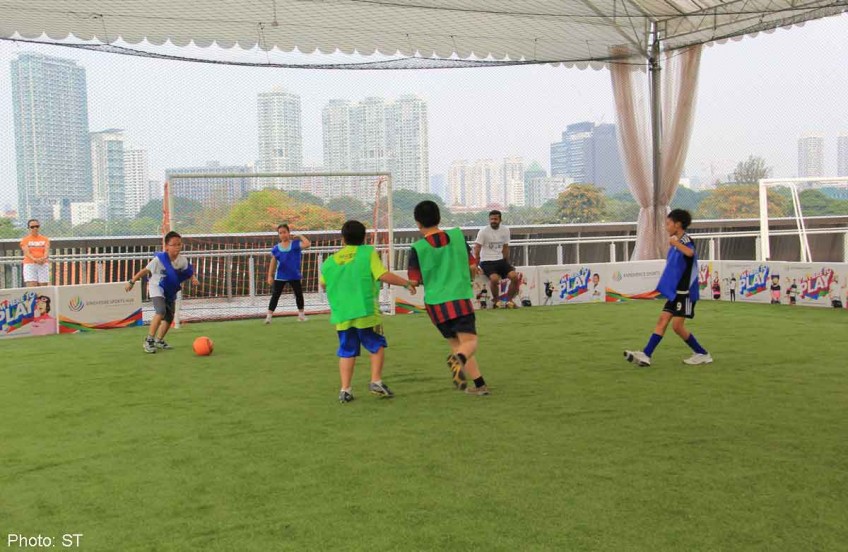Singapore football: Training manual ignored, kids lack quality guidance


Abdullah Noor remembers being heckled by parents of young footballers for devoting months of training to basic skills like heading a ball, or looking up to see where team-mates were.
"They wanted me to teach their kids how to score, not how to play properly," said the former national player, who coached for nine years at the Singapore Sports School.
"But if you don't get the foundations right at a young age, it's hard to correct it later."
The anecdote offers an insight into what plagues the youth game in Singapore: an obsession with results at the expense of developing smart and sleek footballers.
National coach Bernd Stange and his predecessor Raddy Avramovic have often griped over local players - even those in the national team - possessing neither an adequate first touch nor spatial awareness.
In countries like Germany and Japan, such techniques are being ingrained from the age of seven.
Unfollowed syllabus
Coaches here said a mindset change is sorely needed if Singapore is to rejuvenate its pipeline of producing talent.
A veteran coach, who declined to be named, said: "My principal said the football team will be scrapped if we don't reach the nationals tournament.
"There's no time to harness the basics - I focus on the two or three boys who can get the goals while the rest just have to defend."
Such a practice is prevalent across the youth coaching system in schools. Few follow the National Football Syllabus - rolled out in 2010 by the Football Association of Singapore (FAS) - which focuses on quick passes, ball control, rapid movement and fitness.
Even fewer adopt the 4-2-3-1 tactical system that the FAS has implemented for its youth and senior teams.
"Schools must be incentivised to do a national service of sorts and buy into the FAS system. It is for the good of Singapore football after all," said Dilwant Singh, football coach of Jurongville Secondary.
Kids want to play
An FAS survey of 100 primary schools earlier this year found that nearly one in two children wanted to play football - but only 5.9 per cent of boys and 1.6 per cent of girls actually had the chance to.
It does not help that the streamlining of Centres of Excellence (COEs) - run by S-League clubs - from eight to three last year has slashed the youth player pool from 600 to 450.
In town for a clinic earlier this month, Liverpool FC's U-14 assistant coach Fraser Ablett said it is vital for the national team that all S-League clubs have their own youth teams.
"There's rivalry, which is good because players always want to be better, and work hard towards representing their club," he noted.
But having a COE in each club is not the be all and end all solution for development.
Ex-Tanjong Pagar striker Monsef Zerka, who rose through the ranks at AS Nancy before going on to play for French club Nantes and New England Revolution in the United States, said: "The young players must be coached properly, at good facilities with good coaches.
"There must also be constant engagement, where young players are taught the right practices, and told constantly how they are doing and how to improve."
No time to play
For those who progress to the FAS' National Football Academy (NFA), which comprises the national U-15, U-16, U-17 and U-18 teams, juggling studies and training presents another challenge.
Jita Singh, FAS' head of game development for seven years until April, saw kids arrive for matches exhausted after training for both their school outfits and NFA.
"Add in their studies, and what we had were 'zombies', too tired to even kick a ball in anger," said Singapore's 1980 Malaysia Cup-winning coach.
He suggests that the 100-odd NFA players be exempted from all school competitions, allowing them to focus on top international tournaments.
It worked for the Cubs in 2010.
They claimed a Youth Olympic Games bronze after six months of centralised training.
Abdullah, who was the assistant coach of that squad, suggests changes to the National Football Syllabus, the brainchild of outgoing FAS technical director Slobodan Pavkovic.
He said: "We should be more flexible with the tactics taught to children.
"If we want all-rounded players, they must understand every style."
World Cup winners Germany are a prime example.
When they revamped their entire youth system a decade ago, youngsters were taught to adapt to different styles rather than focus on one playing philosophy.
As the FAS aims to have a $25.7 million National Training Centre ready by December 2017, significant groundwork lies ahead for the new home of national age-group sides to flourish.
nsanjay@sph.com.sg
siangyee@sph.com.sg

This article was first published on Dec 14, 2014.
Get a copy of The Straits Times or go to straitstimes.com for more stories.